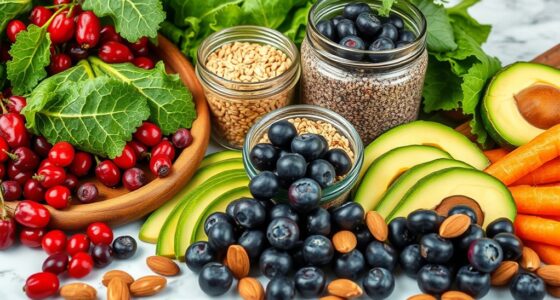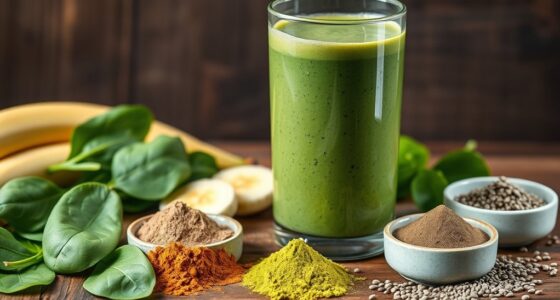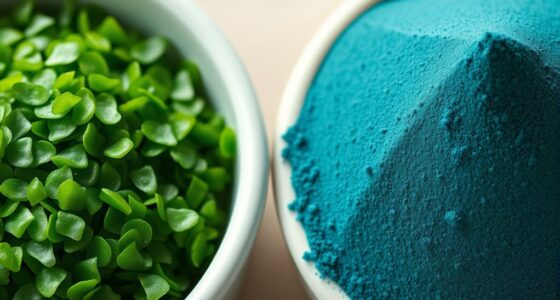If you’re following a raw food diet, supplements like vitamin B12 and vitamin D are often necessary because whole plant foods may not provide enough of these nutrients. B12 needs to be taken regularly, preferably in the morning and separately from iron-rich foods, while vitamin D is best absorbed when taken with your largest meal. Incorporating healthy fats and strategic timing can boost nutrient absorption—discover more on how to optimize your diet successfully.
Key Takeaways
- Raw food diets often lack vitamin B12, requiring regular supplementation for optimal health.
- Vitamin D is scarce in raw plant-based foods and is best obtained through supplements or sun exposure.
- Fat-soluble vitamins (D, E) are better absorbed when consumed with healthy fats like nuts and seeds.
- Proper timing and food pairing (e.g., B12 on an empty stomach, D with the largest meal) enhance nutrient absorption.
- Minimal food processing preserves nutrients, but supplements help fill nutritional gaps in a raw food diet.

Following a raw food diet can be rewarding, but it often raises concerns about meeting all your nutritional needs. One key issue is understanding how to optimize your intake of essential nutrients, especially since cooking methods typically used in conventional diets are avoided. When you consume raw foods, you’re relying on fresh fruits, vegetables, nuts, seeds, and sprouted grains, which are rich in nutrients but can sometimes lack certain vitamins and minerals. To maximize nutrient absorption, it’s important to consider how you prepare your foods. For example, soaking and sprouting seeds and grains can make nutrients more bioavailable. While you’re not cooking in the traditional sense, some raw food enthusiasts lightly dehydrate or blanch foods to enhance digestibility and flavor, but it’s vital to keep these processes minimal to preserve nutrients.
Another critical aspect is supplement timing. Since some nutrients are more effectively absorbed when taken at specific times or in combination with others, it’s wise to plan your supplement intake accordingly. For instance, vitamin B12, which is absent in plant-based raw foods, needs to be supplemented regularly. You might find it most effective to take B12 in the morning, separate from meals that contain iron-rich foods, as iron can interfere with B12 absorption. Similarly, vitamin D, which is difficult to obtain solely from a raw plant-based diet, is best taken with your largest meal of the day, when absorption is maximized. If you’re taking multiple supplements, spacing them out throughout the day helps prevent competition for absorption in your gut.
Since raw food diets emphasize natural foods, you might wonder whether supplement timing is less important. However, timing can considerably impact how well your body utilizes these nutrients. For example, fat-soluble vitamins like D and E are better absorbed when taken with healthy fats, which are abundant in nuts and seeds. Incorporating these into your meals or snacks enhances absorption. Likewise, if you’re supplementing with B12 or other water-soluble vitamins, taking them on an empty stomach or between meals can improve their effectiveness. Additionally, complementing nutrient intake with a variety of raw foods enhances overall absorption and health benefits.
Frequently Asked Questions
Can Raw Food Diets Meet All Mineral Requirements?
Raw food diets can meet many mineral needs, but soil minerals and enzyme activity play vital roles. You might struggle to get enough minerals like zinc or magnesium if your produce lacks soil mineral content or enzyme activity, which helps nutrient absorption. To guarantee you’re meeting all mineral requirements, include a variety of organic, mineral-rich foods and consider supplementing if your diet’s soil minerals and enzyme activity are insufficient.
Are There Specific Signs of Nutrient Deficiencies on Raw Diets?
Think of your body as a finely tuned garden needing the right nutrients. If you notice food allergies or digestion issues, it’s like weeds sprouting unexpectedly—warning signs of deficiencies. On a raw diet, these symptoms can signal missing vitamins or minerals. Stay alert for fatigue, skin issues, or hair loss, which might indicate nutrient gaps. Addressing these early keeps your body thriving, just like tending a healthy garden.
How Do Raw Food Diets Affect Immune Health?
Raw food diets can boost your immune health by enhancing enzyme activity and supporting a diverse gut microbiome. You may experience improved digestion and better nutrient absorption, which strengthens your immune defenses. However, raw diets might also limit some nutrients, so paying attention to your body’s signals is key. By maintaining a balanced raw food intake, you actively promote your immune system’s resilience and overall health.
Is It Safe for Children or Pregnant Women?
Think of raw food safety for children and pregnant women like steering a delicate river. You must carefully chart the safest course to ensure proper child nutrition without risking contamination or nutrient gaps. While a raw food diet can offer health benefits, it’s risky for kids and moms-to-be without proper planning. Consult a healthcare professional to ensure balanced nutrition and safety, making the journey smooth and secure for everyone involved.
How Can I Ensure Proper Absorption of Nutrients Raw?
To guarantee proper absorption of nutrients on a raw food diet, focus on supporting enzyme activity and digestive health. Chew your food thoroughly to aid digestion, and include fermented foods like sauerkraut or kimchi to boost beneficial enzymes. Staying hydrated helps your digestive system work efficiently. By maintaining a healthy gut environment, your body can better absorb essential nutrients, maximizing the benefits of your raw food intake.
Conclusion
Whether you’re considering B12, D, or other supplements, remember that proper planning is key. Stay informed, stay mindful, and stay balanced to meet your nutritional needs. Supplements can support your raw food journey, but they shouldn’t replace whole foods. Keep learning, stay curious, and listen to your body. By doing so, you’ll nourish yourself fully, confidently, and naturally on your raw food path.










